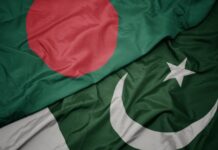Pakistani Prime Minister Shehbaz Sharif landed in China on Tuesday for a two-day official visit at the country’s Premier Li Keqiang’s invitation. This is his first trip to the neighboring country since assuming office in April this year. The country’s Foreign Minister Bilawal Bhutto-Zardari, Finance Minister Ishaq Dar, among other Pakistani officials are part of the delegation accompanying the PM.
Ahead of his departure, Sharif posted on the social media site Twitter saying: “Honored to be among the first few leaders to have been invited after the historic 20th National Congress of the Communist Party of China. At a time when the world is grappling with multiple challenges, Pakistan and China stand together as friends and partners.”
The prime minister further said in his tweet that discussions with the Chinese leadership would focus on the “revitalisation of the China-Pakistan Economic Corridor (CPEC) among many other things”.
At a time of drastic global geopolitical realignments, Sharif’s visit to China is being closely watched by the West, due to Islamabad’s commitment to different international economic institutions like the International Monetary Fund (IMF) and the World Bank, from whom Pakistan is seeking financial assistance and which view China as an exploitative power.
It is well-known that the Chinese economic ambitions are expansionist. As records show, strategic infrastructure projects are taken up globally in an attempt to set up major debt traps for countries. Chinese financial assistance in the form of “easy loans” have already destabilized countries like Sri Lanka, Laos and Mongolia. But Pakistan appears to push ahead making financial and economic deals with China that are neither transparent, nor do they seem to benefit the country.
The China Pakistan Economic Corridor (CPEC), launched in April 2015 was supposed to turn around Pakistan’s economy. Despite all such rhetoric in public from the leadership in both countries that it will lift ordinary Pakistanis from poverty, the CPEC is yet to deliver on its promises. Experts say that Chinese projects are benefiting only a handful of the elite of the country, and this perception further took root when Imran Khan, the cricketer-turned-politician came to power. Khan had already questioned the transparency of the CPEC, and once in power, he created a CPEC Authority, which added a bureaucratic layer, slowing down the CPEC projects further.
On the other hand, in recent years, Islamabad’s relationship with the West, and primarily with Washington has also been under pressure, especially since the US withdrawal from Afghanistan last year. This relationship worsened even further since the downfall of Imran Khan’s government this year, as he accused the US of orchestrating his ouster from power.
Since then, an attempt has been made to improve the ties between the two countries by PM Sharif and Pakistan’s military chief General Qamar Bajwa, who dominates the country’s foreign policy. They made official visits to the US recently, following which there were speculations about improvement in ties between the two countries.
However, it appears that Islamabad is also continuing to strengthen its relationship with China – a rival of the US, which could create complications for Pakistan going forward as it may need to choose a side. In fact, Pakistan’s balancing act between the West and China has been quite dubious, with the country giving assurance to both sides of commitment to their respective interests in the region. But for how long will Pakistan continue to fool the West and China – it is a question that policy makers in Washington and Beijing must ask themselves.
